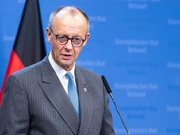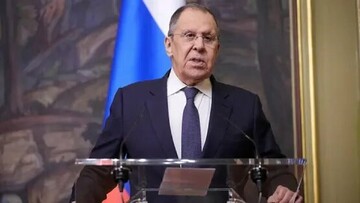-
 2026-02-04 23:03
2026-02-04 23:03
By Staff Writer
US poised to return to the negotiating table it bombed in June
Iranians offer Trump another chance after regional countries step in
TEHRAN – Iranians have agreed to give diplomacy with the United States another chance after at least seven regional countries urged Tehran in calls with President Masoud Pezeshkian to set aside Washington’s long record of bad faith and pursue talks.
-

Iran calls Merz naive, hopes a ‘mature’ person would take over leadership in Germany
TEHRAN – Iran’s foreign minister has lashed out at German Chancellor Fredrich Merz, expressing hope that a “mature” person will return to German leadership.
-

Ex-nuclear chief warns against foreign ‘mischief’ as Iran and US set to resume nuclear talk
TEHRAN - The former director of Iran’s Atomic Energy Organization has expressed optimism about the looming nuclear negotiations between Iran and the United States.
-

Group painting exhibition “Timeless Love” opens on birth anniversary of Imam Mahdi (AS)
TEHRAN – Coinciding with the birth anniversary of Imam Mahdi (AS), Akhlagh Cultural Center in Tehran is hosting the group painting exhibition “Timeless Love”.
-

By Faramarz Kouhpayeh
Killing with sanctions, lying with statistics
Iran releases names of 3000 killed in January unrest after days of fabricated and politically motivated reporting by Western media
TEHRAN – On Sunday, Iran took the step of publishing the names and national ID numbers of nearly 3,000 individuals killed during the unrest that swept through the country between January 8 and January 14. According to officials, this move was a direct response to weeks of politically motivated reporting and fabrication by Western media outlets.
-

By Fatemeh Kavand
‘American rescue’: A mask of compassion, a face of plunder
TEHRAN - While the Trump administration is officially considering regime-change options in Cuba, reviewing the experiences of countries previously targeted for “American rescue” shows that this concept is not about the welfare of nations—it is a cover for blockade, pressure, and systematic plunder. This pattern also explains Washington’s hostility toward Iran.
Politics
-

Iran has strengthened deterrence by upgrading its ballistic missiles: military chief
TEHRAN - Visiting an IRGC missile town on Wednesday, Chief of the Staff of the Iranian Armed Forces said the Islamic Republic has strengthened its deterrence power by upgrading its ballistic missiles.
-

War on Iran could blow up entire region, Lavrov warns
TEHRAN - Russian Foreign Minister Sergey Lavrov has warned the Middle East is like a powder keg waiting for a chain reaction, and a war between the U.S. and Iran could trigger it.
-

Iranians won’t succumb to psychological warfare: 2600 Iranian psychologists tell US
TEHRAN - Some 2600 psychologists and advisors from various Iranian universities have signed a statement in reaction to Washington’s repeated military threats against Iran and efforts to inject psychological instability into the Iranian society.
Sports
-

Iran target gold at 2026 Para Volley World Championships: Rezaei
TEHRAN – Hadi Rezaei, head coach of Iran’s national sitting volleyball team, says the team are determined to win the gold medal at the 2026 Para Volley World Championships, an event that also serves as a qualification pathway for the 2028 Paralympic Games in Los Angeles.
-

Iran into 2026 AFC Futsal Asian Cup final
TEHRAN - Iran will defend their title after they twice came from behind to defeat Iraq 4-2 in their AFC Futsal Asian Cup Indonesia 2026 semi-final on Thursday.
-

Iran’s relentless march toward another Asian futsal crown
TEHRAN - Iran’s national futsal team once again find themselves exactly where they expect to be: deep in the business end of the AFC Futsal Asian Cup.
Culture
-

Group painting exhibition “Timeless Love” opens on birth anniversary of Imam Mahdi (AS)
TEHRAN – Coinciding with the birth anniversary of Imam Mahdi (AS), Akhlagh Cultural Center in Tehran is hosting the group painting exhibition “Timeless Love”.
-

“Shadow of Security” unveiled at Art Bureau
TEHRAN- The unveiling ceremony for “Shadow of Security,” a painting by Iranian artist Hassan Ruholamin, was held at the Art Bureau of the Islamic Ideology Dissemination Organization in Tehran on Tuesday.
-

Karaj theater to host reading performance of “Twelve Angry Men”
TEHRAN- Master Sirous Saber Theater in Karaj will be playing host to a reading performance of American screenwriter and playwright Reginald Rose’s “Twelve Angry Men” on Friday.
Economy
-

Curbing inflation, primary priority of monetary policy: CBI governor
TEHRAN- The Governor of the Central Bank of Iran (CBI), outlining the priorities of monetary and exchange rate policies, emphasized this institution's complete focus on sustainably curbing inflation, deepening the forex trading market, and the necessity of cooperation from other government bodies to navigate the current complex situation.
-

Industry minister inaugurates major development projects in Yazd province
TEHRAN- The Wednesday trip of the Minister of Industry, Mining, and Trade to Yazd Province turned into a scene of decision-making and practical action in the field of production and industrial investment.
-

IME financial market turnover expected to reach $20b
TEHRAN – Iran Mercantile Exchange (IME) expects the value of transactions in its financial markets to approach $20 billion by the end of the current Iranian year (late March), IME chief executive said.
Society
-

Vice-presidency for science details supports for space industry development
TEHRAN – The Vice-presidency for Science, Technology, and Knowledge-Based Economy has announced plans to support the private sector’s knowledge-based companies active in the space industry to secure their supply chain.
-

Opportunities, challenges of digital health in Iran
TEHRAN – Modern communication technologies have fundamentally changed people’s lifestyles, social interactions, and access to information, with the health sector going through digital transformation, being no exception.
-

Deadline extended for foreign students to attend Persian language proficiency test
TEHRAN - The deadline for foreign students to register for the first Persian language proficiency test has been extended by the National Education Assessment Organization.
Tourism
-

New excavation starts at Sassanian Ardeshir Palace
TEHRAN – Iranian archaeologists have launched a new season of archaeological research and excavation at the Sassanian-era Ardeshir Palace in Firuzabad, southern Fars province.
-

Possible remains of monumental Persian garden identified near Tabriz
TEHRAN – A team of researchers say they have identified what may be the remains of a large monumental garden complex on the outskirts of Tabriz in northwestern Iran, based on analysis of historic aerial imagery and satellite data.
-

The minaret that lit the way
TEHRAN- Rising above the historical city of Golpayegan in Isfahan province, the Golpayegan Minaret stands as a prominent reminder of Iran’s Seljuk-era architectural achievements and the region’s role in historic travel routes.
International
-

Israel kills 18 Palestinians in Gaza bombing
TEHRAN- Israeli fighter jets bombed the Gaza Strip early on Wednesday, killing at least 18 Palestinians, including three children, according to local media.
-

UN chief urges Gaza aid as Israel blocks most medical evacuees at Rafah
TEHRAN- United Nations chief Antonio Guterres again has called on Israel to immediately allow humanitarian aid into the Gaza Strip, as the Israeli authorities continue to block dozens of Palestinians from exiting the war-ravaged enclave to seek medical treatment.
-

Trump’s call to ‘nationalize’ elections draws furious pushback
TEHRAN- President Donald Trump on Tuesday doubled down on his controversial suggestion that Republicans "nationalize" elections as he continued to make false claims of widespread voter fraud and refused to accept his 2020 defeat, ABC news reported.
Most Viewed
-
Trump is retreating — here is why: John Helmer on Washington’s Iran strategy
-
US poised to return to the negotiating table it bombed in June
-
Ex-nuclear chief warns against foreign ‘mischief’ as Iran and US set to resume nuclear talk
-
Group painting exhibition “Timeless Love” opens on birth anniversary of Imam Mahdi (AS)
-
Iran among top eight countries in intl. Olympiads
-
Iran’s economic project pipeline valued at $240b
-
Iran ranks among top 10 countries by thermal power capacity
-
Power projects worth $1.1b to be inaugurated across Iran
-
122 earthquakes hit Iran in a week
-
Trump’s call to ‘nationalize’ elections draws furious pushback
-
Car output down 7% in nine months
-
Israel kills 18 Palestinians in Gaza bombing
-
Iran has strengthened deterrence by upgrading its ballistic missiles: military chief
-
Consultations underway for venue of nuclear talks between Iran and US: Iranian Foreign Ministry
-
Iran into 2026 AFC Futsal Asian Cup final












